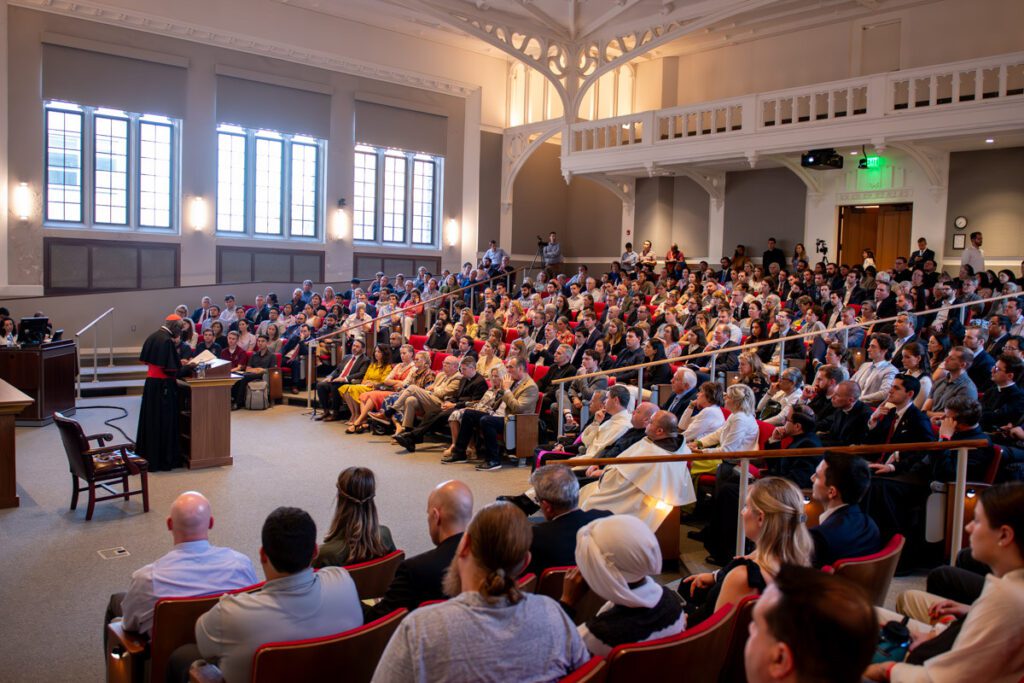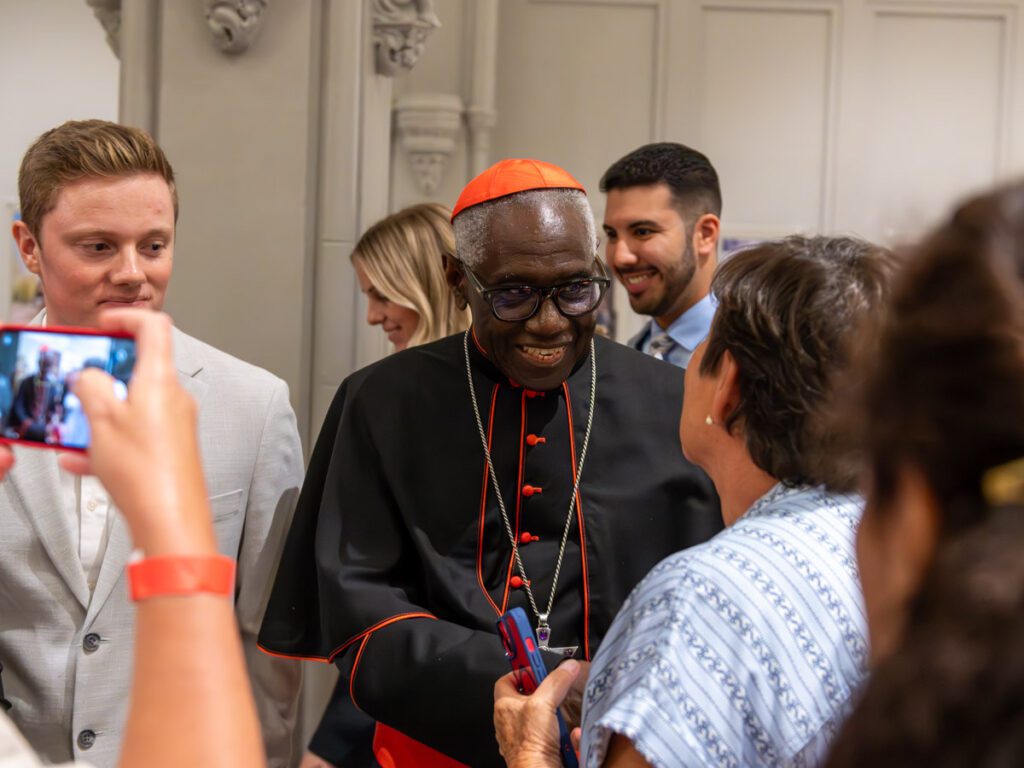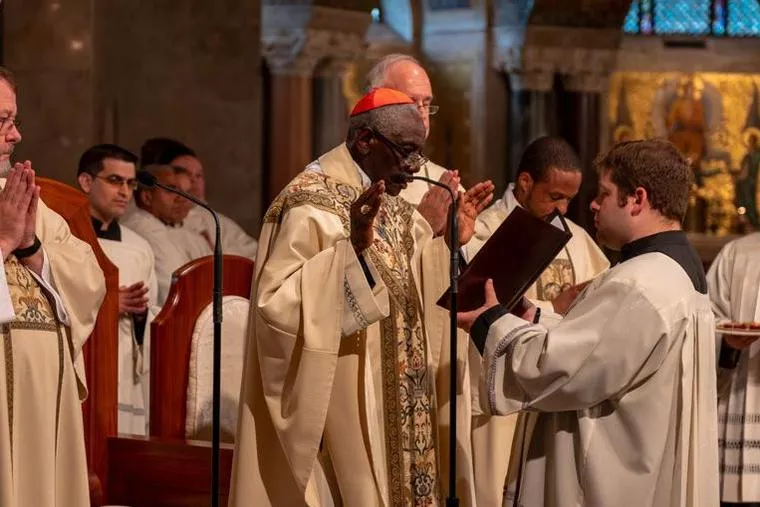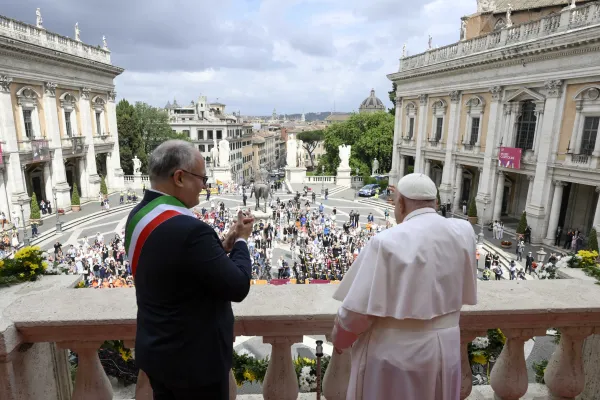Cardinal Sarah Warns of Dangers of ‘Practical Atheism’ Even Within Church
By Shannon Mullen, The National Catholic Register
More than 30 years ago, Pope St. John Paul II helped bring about the downfall of the Soviet Union, which had sought to impose its Communist atheism on his native Poland and the rest of the world.
“On one level, we won that war,” Cardinal Robert Sarah reflected in an address Thursday night at The Catholic University of America in Washington, D.C.
Yet on another level, he added, that war “continues on a global and national level.” But instead of a hardened, ideological atheism, the foe today is a “practical atheism.” While it might not go so far as to deny that God exists, the senior African prelate explained, it deems him to be irrelevant to modern life.
In the decades since the collapse of the Iron Curtain, he said, this same “dangerous disease” has run roughshod across Europe, where the Catholic faith that for centuries shaped and defined not only the continent but Western civilization, is “dying or dead.” More worrisome to Cardinal Sarah, it has gained a foothold in the Church.
“How often do we hear from theologians, priests, religious, and even some bishops — or bishops conferences — that we need to adjust our moral theology for considerations that are only human,” he said.
Yet “a Church based on human resolutions,” the cardinal warned, “becomes only a human church.”
Cardinal Sarah, who is from Guinea in West Africa, served as Secretary of the Congregation of the Evangelization of Peoples under John Paul II, was made a cardinal by Pope Benedict XVI, and became prefect of the Congregation for Divine Worship and the Discipline of the Sacraments under Pope Francis. He retired from that post in 2021when he reached the retirement age of 75.

A prolific author known for his robust defense of Catholic orthodoxy, Cardinal Sarah, who turns 79 on June 15, spoke for nearly an hour in a crowded lecture hall at CUA’s Busch School of Business. His address, co-sponsored by the Napa Institute and the Catholic Information Center in Washington, D.C., provided a frank appraisal of what he sees as a gradual but steady slackening and marginalizing of religious faith in the West.
“It is not an outright rejection of God, but it pushes God to the side,” he said of a practical atheistic mindset. However, he added, “The crisis is not so much the secular world and its evils, but the lack of faith within the Church.”
“How many Catholics attend weekly Mass? How many are involved in the local Church? How many live as if Christ exists, or as if Christ is found in his or her neighbor, or with the firm belief that the Church is the Mystical Body of Christ? How many priests celebrate the Holy Eucharist as if they are truly alter Christus, and, even more so, as if they are ipse Christus —Christ himself? How many believe in the Real Presence of Jesus Christ in the Holy Eucharist?
“The answer is too few. We live as if we do not need redemption through the blood of Christ,” he said. “That is the practical reality for too many in the Church.”
The cardinal also spoke critically of aspects of the ongoing Synod on Synodality, a multi-year process of listening and discernment initiated by Pope Francis that culminates with a second and final assembly of bishops and other delegates from around the world in October at the Vatican. Specifically, he faulted what he sees as the Synod’s push to give heterodox views an outsize importance in the process.
“To be Catholic is more than a culture identification; it is a profession of faith. It has a particular content of faith. To move outside that content, both in belief and practice, is to move outside of faith,” the cardinal said.
“It is a grave danger to consider all voices legitimate,” he added. “This would lead to a cacophony of voices that amount to noise, which seems to be growing louder these days. As Cardinal Ratzinger said: ‘A faith we can decide for ourselves is no faith at all.’”
None of the proponents of this paradigm shift within the Church “reject God outright, but they treat Revelation as secondary, or at least on equal footing with experience and modern science,” the cardinal said.
“This is how practical atheism works. It does not deny God but functions as if God is not central. We see this approach not only in moral theology but also in liturgy. Sacred traditions that have served the Church well for hundreds of years are now portrayed as dangerous. So much focus on the horizontal pushes out the vertical, as if God is an experience rather than an ontological reality.
How should faithful Catholics respond to these challenges? Cardinal Sarah first called on bishops in the United States to speak out clearly and courageously in defense of the faith and the centrality of Jesus Christ.

“The United States is not like Europe. The faith is still young and maturing. This young vitality is a gift to the Church,” he said. “Your seminaries have largely been reformed, lay apostolates are breathing new life into the faith, in parishes there are pockets of life, and my sense is that your episcopal leadership is generally committed to the Gospel, faith in Jesus Christ, and a preservation of our Sacred Tradition,” the cardinal observed.
“No doubt there are divisions and internal conflict, but there is not a wholesale rejection of the Catholic faith as we see in many parts of Europe and South America. My observation is that there are models of faith here in the United States that could perhaps be a lesson for other Western countries.”
Cardinal Sarah noted how the Church in Africa, “which is also young,” has provided “heroic witness to the faith” in voicing opposition to Fiducia Supplicans, the Vatican’s declaration released in December that authorized non-liturgical blessings of same-sex couples. Cardinal Sarah called the document “misguided.”
The Church in the United States can also be a witness to the faith, Cardinal Sarah said
“America is big and powerful politically, economically and culturally. With this comes great responsibility,” he stressed.
“Imagine what could happen if America were to become home to even more vibrant Catholic communities. The faith of Europe is dying or dead. The Church needs to draw light from places like Africa and America, where the faith is not dead,” he said.
“If Catholics in this country can be a sign of contradiction to your culture,” he concluded, “the Holy Spirit will do great things through you.”
The Napa Institute has published the full text of Cardinal Sarah’s address here. You can also watch the address on Napa’s YouTube channel.




